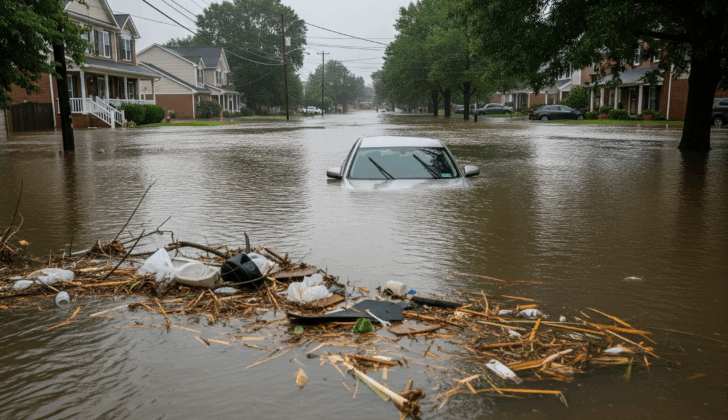Beyond the Water: How Floods Affect Your Health Long After the Waters Recede
When most people think about floods, they imagine the immediate chaos: rushing water, stranded families, damaged homes, and emergency rescues. But what happens after the floodwaters disappear? For many, the worst may just be beginning.
Floods don’t just damage buildings and roads—they also leave lasting impacts on human health. From waterborne illnesses to long-term mental health issues, floods can affect individuals and communities for weeks, months, or even years after the initial disaster.
Let’s break down the hidden and lasting health consequences of floods, and what you can do to protect yourself and your loved ones.
1. Waterborne Diseases: A Surge in Illness After Floods
After a flood, the water that fills homes and streets isn’t clean—it’s often filled with sewage, chemicals, and bacteria. As a result, there’s a high risk of waterborne illnesses, including:
-
Cholera
-
Hepatitis A
-
Leptospirosis
-
Gastrointestinal infections
Contaminated drinking water, contact with floodwaters, or consuming improperly washed food can quickly lead to widespread outbreaks.
Protect yourself:
-
Boil water before drinking if it’s not declared safe.
-
Wash hands frequently with soap.
-
Avoid swimming or wading in floodwaters.
2. Vector-Borne Diseases: Mosquitoes Love Standing Water
Floods create ideal breeding grounds for mosquitoes, which can lead to a spike in diseases like:
-
Dengue fever
-
West Nile virus
-
Zika virus
-
Malaria (in some regions)
Standing water in buckets, puddles, and containers becomes a mosquito paradise.
Prevention tips:
-
Remove standing water around your home.
-
Use insect repellent and mosquito nets.
-
Wear long sleeves and pants outdoors.
3. Respiratory Issues from Mold and Damp Conditions
After a flood, moisture can linger in homes and buildings, encouraging the growth of mold and mildew. Inhaling mold spores can worsen conditions such as:
-
Asthma
-
Bronchitis
-
Allergies
Children, the elderly, and those with weakened immune systems are especially at risk.
Mold control tips:
-
Dry out your home as quickly as possible.
-
Use dehumidifiers and fans.
-
Wear an N95 mask when cleaning up mold.
4. Mental Health: PTSD, Anxiety, and Depression
The emotional toll of experiencing a flood can be just as devastating as the physical damage. Survivors often face:
-
Post-traumatic stress disorder (PTSD)
-
Depression
-
Anxiety
-
Sleep disturbances
Losing a home or loved one, displacement, or financial hardship adds to the mental strain.
Mental health support:
-
Talk to a therapist or counselor.
-
Lean on friends and community groups.
-
Don’t be afraid to ask for help—mental health is health.
5. Chronic Conditions: Interrupted Care Can Be Dangerous
Floods often disrupt access to healthcare facilities, pharmacies, and transportation. For people managing chronic illnesses, this can be dangerous. Conditions such as:
-
Diabetes
-
Hypertension
-
Kidney disease
-
Heart disease
…can quickly worsen without timely medication or care.
Prepare ahead:
-
Keep a go-bag with extra medication, supplies, and a copy of prescriptions.
-
Know the location of alternative clinics or shelters.
-
Notify local emergency services if you have a critical health condition.
6. Disruption to Health Systems: Delays, Closures, and Overcrowding
Hospitals and clinics often suffer during floods. Facilities may be:
-
Damaged or closed
-
Short-staffed
-
Overwhelmed with emergency cases
This makes it harder to treat everything from broken bones to infections or childbirth-related needs.
System solutions:
-
Emergency preparedness planning is key.
-
Mobile clinics and telehealth services can help fill the gaps during recovery.
Who Is Most at Risk?
Some groups are especially vulnerable to the health effects of floods:
-
Children and infants
-
Elderly adults
-
People with disabilities or chronic conditions
-
Low-income communities
-
Pregnant women
Being aware of the risks and having an emergency plan in place can make all the difference.
Final Thoughts: Health Protection Starts Before the Flood
Floods are powerful, but we can be stronger by staying prepared and informed. The health impacts of floods may not always be visible, but they are very real—and they deserve just as much attention as the storm itself.
Stay safe, plan ahead, and remember:
Health recovery after a flood doesn’t end when the water recedes—it’s just beginning.












